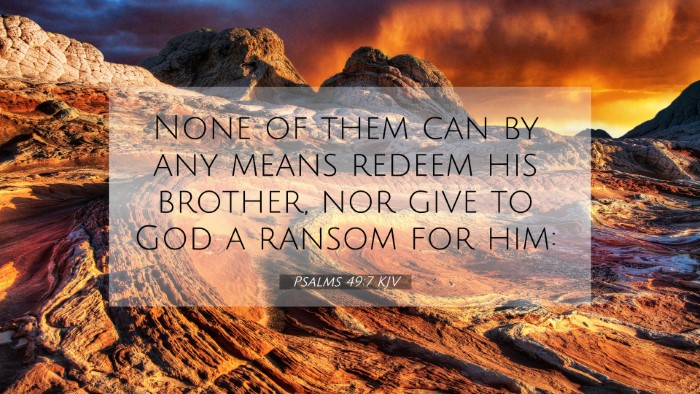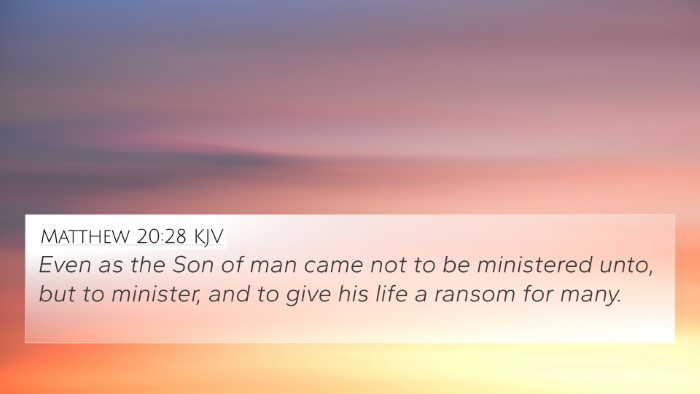Understanding Psalms 49:7
Psalms 49:7: "None of them can by any means redeem his brother, nor give to God a ransom for him."
This verse emphasizes the inherent limitations of humanity in matters of redemption. In the context of the Psalm, it serves as a stark reminder of the inability of individuals to redeem themselves or others through their own means.
Meaning and Interpretation
From the insights gathered from various public domain commentaries:
- Matthew Henry: Henry highlights that earthly possessions and wealth cannot secure spiritual redemption. He stresses that humanity is bound by sin, and no material or human effort can suffice to restore one's relationship with God.
- Albert Barnes: Barnes elucidates the futility of relying on others or oneself for salvation. He notes that the price for redemption is far beyond human capability—only God can provide true redemption through His grace.
- Adam Clarke: Clarke notes that this verse underscores the personal responsibility for sin. He indicates that one cannot substitute another or offer payment for transgressions; redemption is a divine act, not one of purchase.
Thematic Connections in the Bible
This verse can be correlated with several themes and concepts found throughout the scriptures:
- Human incapacity: The verse resonates with Job 14:4, which asks, "Who can bring a clean thing out of an unclean?" highlighting human limitations.
- Divine redemption: The theme of God's redemptive power is echoed in Isaiah 43:1, where God claims His people and speaks of their redemption.
- Christ's sacrifice: The New Testament view of redemption through Christ is best illustrated in Ephesians 1:7, which states that we have redemption through His blood.
- Gift of salvation: This connects to Romans 6:23, emphasizing that the gift of God is eternal life, contrasting human attempts at righteousness.
- Dependency on grace: 2 Timothy 1:9 speaks of God saving us and calling us not according to our works, which reflects the idea that nobody can redeem themselves.
- True wealth: In Matthew 16:26, Jesus states that what profit is there to gain the whole world yet lose one’s soul, reminding us of the futility of earthly riches.
- Intercessory prayer: This verse gently nudges believers towards understanding that only Christ as our High Priest (Hebrews 4:14-16) intercedes on our behalf.
Cross-Referencing Biblical Texts
The value of cross-referencing in understanding the scriptures enhances our insight into verses like Psalms 49:7. Here are some effective methods and tools:
- Bible Concordance: A comprehensive Bible concordance can help identify where themes of redemption and human limitation appear throughout scripture.
- Bible Cross-reference Guide: These guides aid in linking themes and verses, providing a broader understanding of how scripture interprets itself.
- Cross-referencing Bible Study: Engaging in cross-referencing during study sessions allows believers to see connections and enrich their understanding of verses in thematic contexts.
- Identifying Connections: Understanding links between Old and New Testament scriptures enables a deeper insight into God's redemptive plan.
- Cross-reference Bible systems: Utilizing cross-reference systems helps in systematic study of Biblical texts, mapping thematic parallels.
- Comparative studies: Analyzing Pauline epistles provides clarity on themes of grace and redemption connected to Psalms 49:7.
Conclusion
Psalms 49:7 serves as a pivotal reminder of humanity’s limitations concerning redemption. Through the careful study and cross-referencing of this verse with others, one can glean profound insights into the nature of redemption, grace, and the eternal significance of Christ’s sacrifice. By exploring biblical themes and verses that interconnect, believers can more fully appreciate the depth of God's plan for salvation.







